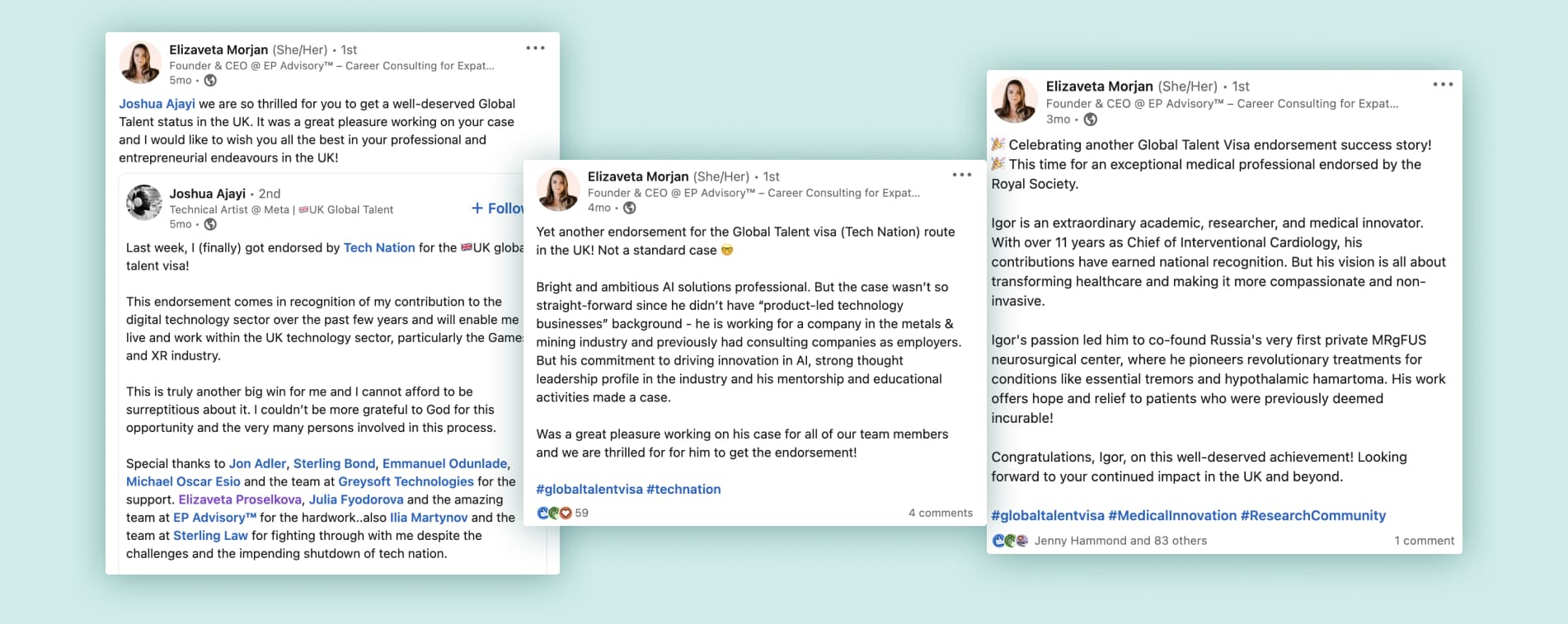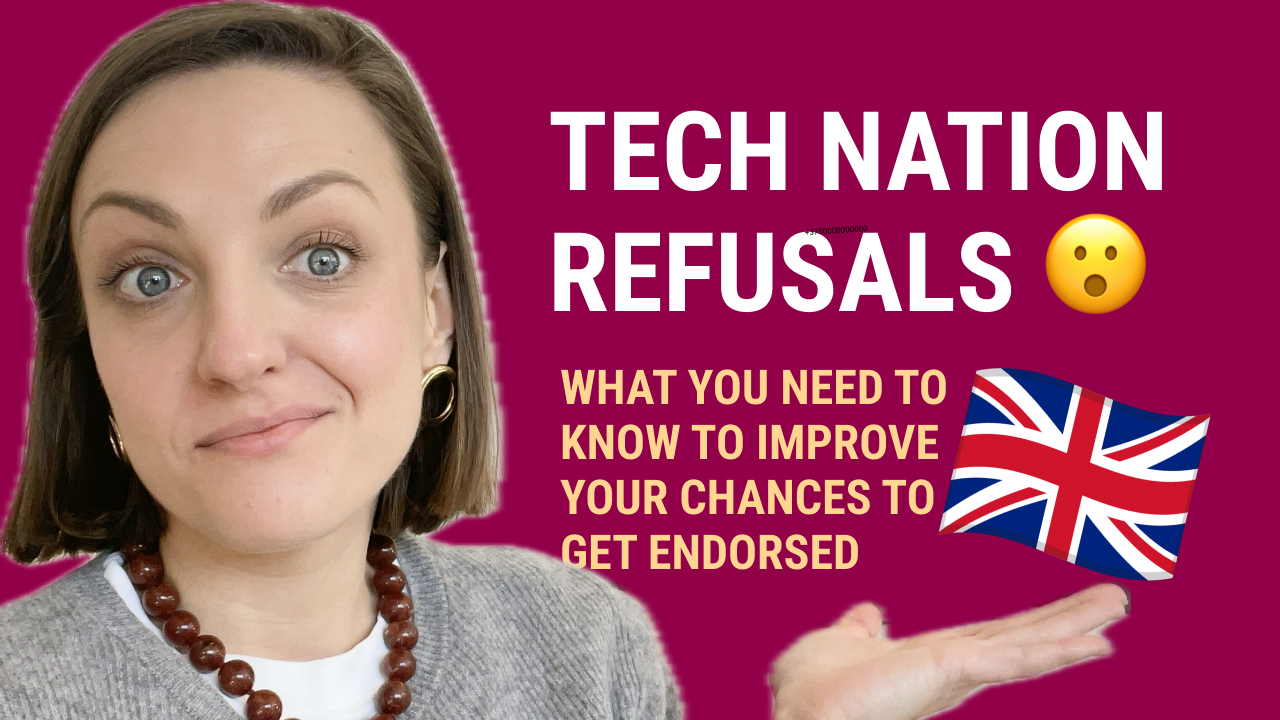The UK Tech Nation Global Talent visa offers a unique opportunity for top tech professionals, but many applicants face rejection due to common mistakes. Below, we break down the rejection reasons by Tech Nation divided into Mandatory Criteria (MC) and Optional Criteria (OC), along with the best strategy to get Tech Nation’s endorsement this year.
There have been a lot of rejections recently, so understanding these rejection reasions is critical if you want to get a Tech Nation Global Talent visa endorsement in 2025.
📌 Make sure you are following the latest version of the guidelines: Tech Nation Global Talent Visa Guide 2025 (Notion)
And if you need support in how to get endorsed by Tech Nation and require personalised guidance, you can work with our team by purchasing a full UK Global Talent visa package. Alternatively, you can get an in-depth evaluation of your case during our 60-min Global Talent consultation.
Mandatory Criteria (MC) for Tech Nation Global Talent Visa
❌ Common rejection reasons:
1. Letters of Recommendation lack credibility
- The referees are not from tech product-led businesses or leading tech companies (people from banks, consulting companies or other non-product companies will get rejected).
- Letters are vague, too general, or overly influenced by the applicant’s personal statement.
- Referees lack strong industry reputations or high-level positions (just managers are team leaders might not be high enough in the organisational hierarchy to provide reference for the UK Global Talent visa).
2. Lack of independent industry validation
- The applicant is recognised within their company but lacks external recognition.
- No proof of awards, major publications, or third-party endorsements.
3. Financial or business documents without context
- Founders/entrepreneurs who submit business financials, company records, or balance sheets without clear links to digital technology leadership.
- No proof of innovation or external validation of the business’s significance in the digital sector.
✅ How to Fix This:
- Ensure referees are senior leaders at recognised product-led digital technology companies.
- Provide external proof of leadership – awards, keynote speeches, press releases.
- If submitting business documents, include clear connections to product innovation, patents, or market influence.
OC1 – Innovation Criteria for Tech Nation Global Talent Visa
❌ Common rejection reasons:
1. Different standards for employees vs. founders
- Employees must show patents, intellectual property (IP), or industry-first contributions to qualify for OC1.
- Founders must show they have created something entirely new – not just another version of an existing product (e.g., launching another marketplace does not count as innovation unless it introduces a groundbreaking feature).
2. Company achievements vs personal innovation
- The evidence highlights the company’s success, but the applicant’s specific role is unclear.
✅ How to fix this:
- If you’re an employee, submit patents, intellectual property, or industry-first contributions.
- If you’re a founder, prove that your innovation is something entirely new – not just another iteration of an existing product.
- Provide clear documentation of your role in product innovation.
- Ensure reference letters explicitly confirm your personal contributions, and back them with third-party evidence such as contracts, product launches, or industry recognition.

OC2 – Activities Outside Occupation Criteria for Tech Nation Global Talent Visa
❌ Common rejection reasons:
1. Content is career-focused instead of industry-advancing
- Talks or panels are related to the career development or leadership principles rather than on the industry-advancing topics.
- Podcasts or articles discussing personal branding or career growth do not meet OC2’s requirement for sector-wide impact.
2. Articles are roo light-touch
- The articles/media recognition are too general, lack in-depth analysis, or do not provide meaningful insight into the tech industry.
3. Articles are too recent
- The articles were published right before the application, giving the impression that they were written only to fulfill the UK Global Talent visa application requirements.
4. Speaking engagements were commercial or sponsored
- The company paid for a speaking slot or was the main organiser which does not count as independent recognition and this evidence will be rejected.
5. Mentorship wasn’t offline or organised through a clear selection process
- Helping colleagues internally or mentoring online only does not prove meaningful industry impact.
- Having no proper selection procedure in place when joining the mentorship programme will disqualify this evidence.
✅ How to fix this:
- Write opinion pieces in major tech publications that influence industry trends and advancements.
- Speak at recognised tech events, panels, or industry conferences (not just company-sponsored events).
- Show a long-term track record of structured, offline mentorship, such as participation in global mentorship programs or industry-wide initiatives.
- Ensure your public appearances (podcasts, speaking, courses) directly contribute to technological advancements and not just cover career or leadership advice.
- Provide additional letters of recommendation, but ensure they are backed by third-party evidence, such as conference invitations, citation records, or endorsements from industry leaders.
We can help with your Global Talent document pack
Find out more about out services for those who wish to immigrate to the UK under this visa route. With an exceptional success rate of 93%, we know all about the requirements for the Global Talent visa.
OC3 – Commercial, Technical, or Entrepreneurial Impact Criteria for Tech Nation Global Talent Visa
❌ Common rejection reasons:
1. No direct link between applicant and their impact
- The applicant cites company revenue increases or product success, but reviewers cannot determine their direct contribution.
- If a company has 1,000 employees, how can the applicant’s personal efforts be directly linked to an increase in stock prices, IPO or revenue?
2. Vague or unsupported business impact
- Reference letters mention success but do not explain how the applicant’s actions led to measurable outcomes.
- Work at a consultancy or non-product-led company even if there was a major impact or contribution will not meet the OC3 requirements.
3. Over-reliance on the company’s awards
- Applicants submit company awards or revenue growth stats without demonstrating their specific contributions to achieving those milestones.
4. Additional letters of recommendation without third-party external verification.
- Adding 2-3 additional letters of support without backing the claims with third-party evidence will disqualify those letters for the OC3.
✅ How to fix this:
- Show how your work directly influenced product development, business growth, or industry-wide change (GitHub PR, JIRA tickets, internal dashboards with your name, etc).
- Use third-party endorsements to validate claims (for example, press releases).
- Ensure reference letters explicitly confirm your impact with measurable results but also are not the only evidence you provide to argue OC3.
- Provide individual contributions rather than relying on general company’s or team’s success stories.
- Additional letters of recommendation should be supported by third-party evidence, such as audited financial documents, contractual agreements, or verifiable business reports.
How can EP Advisory help you obtain UK Global Talent Visa?
We work closely with our legal partners at Sterling Law to maintain the excellent success rate for our clients (93%). We take over document writing whilst Sterling Law check everything from the legal perspective, put their stamp of approval and submit the application for you.
There are three types of services depending on how much support you need:
60-min consultation: Get personalised guidance with a 60-minute consultation from our expert career consultant. We’ll assess your case, offer feedback on your chances, and help you plan evidence collection. We’ll dive into your CV, LinkedIn, and more to uncover ways to enhance your application. Expect advice on awards, mentorship, and outside achievements too.
PRO package: Experience a range of services in one package – an assessment of your case, consultation, and hands-on document support. We’ll craft your CV, LinkedIn, and an outstanding personal statement. Our expert letters of support (3-5, as needed) will be signed by your referees. We guide you through evidence preparation and offer a document review before submission. Count on us for a draft of your Stage 1 application too.
FULL SUPPORT package: Dive into comprehensive assistance – from start to finish. Begin with our assessment and consultation. Let us create your CV, LinkedIn, personal statement, and reference letters. We’ll handcraft all evidence pieces, assemble your documents, and submit your applications for both stages. In case of a refusal, our legal team’s expertise will guide you toward turning it around.
Read more about our services here. If you’re interested in the Global Talent visa, try our short test and find out if you are eligible.
Get endorsed for the UK Global Talent visa with our help
If you wish to immigrate to the UK under the Global Talent visa – we can help. With an exceptional success rate of 93%, we know all about the requirements for the Global Talent visa.







